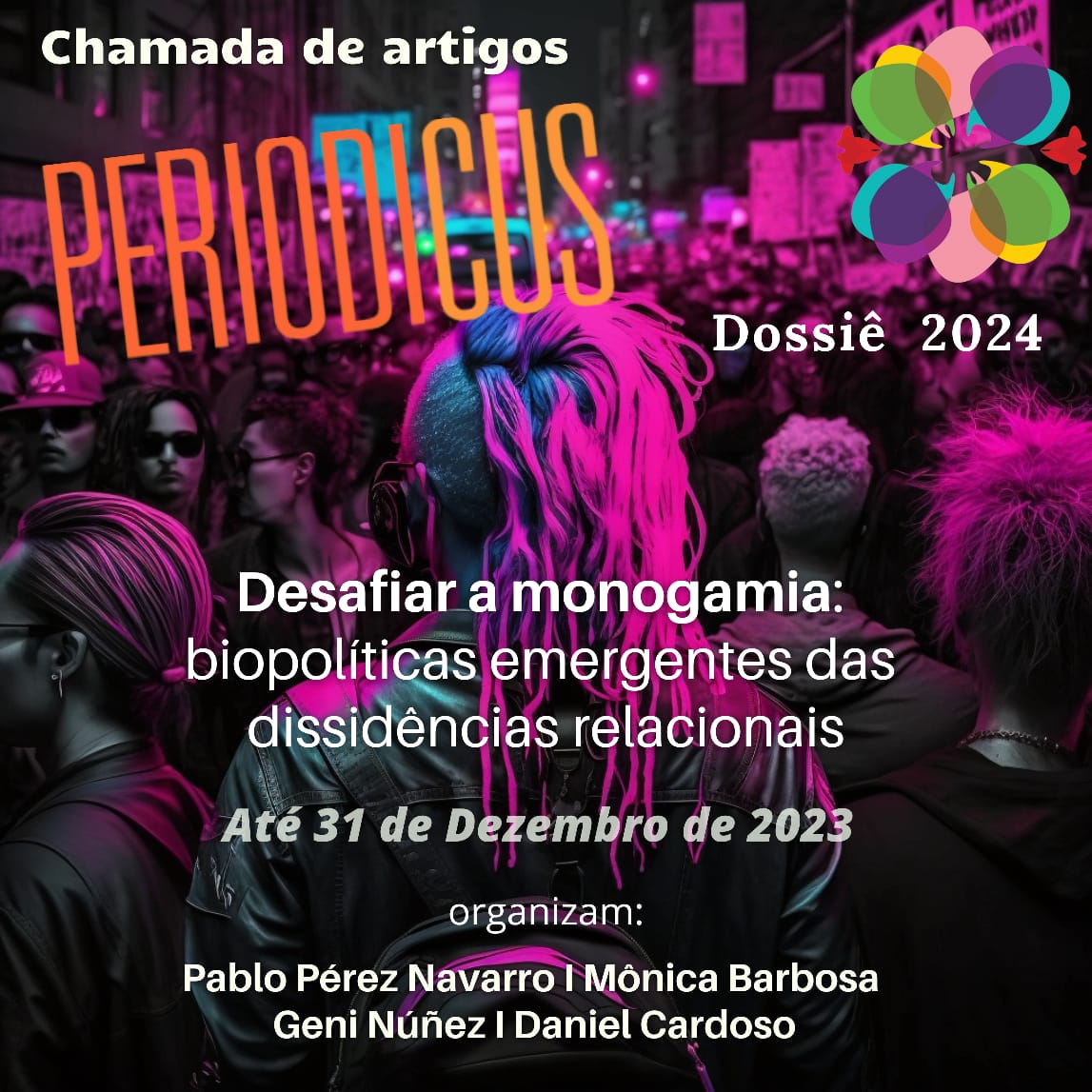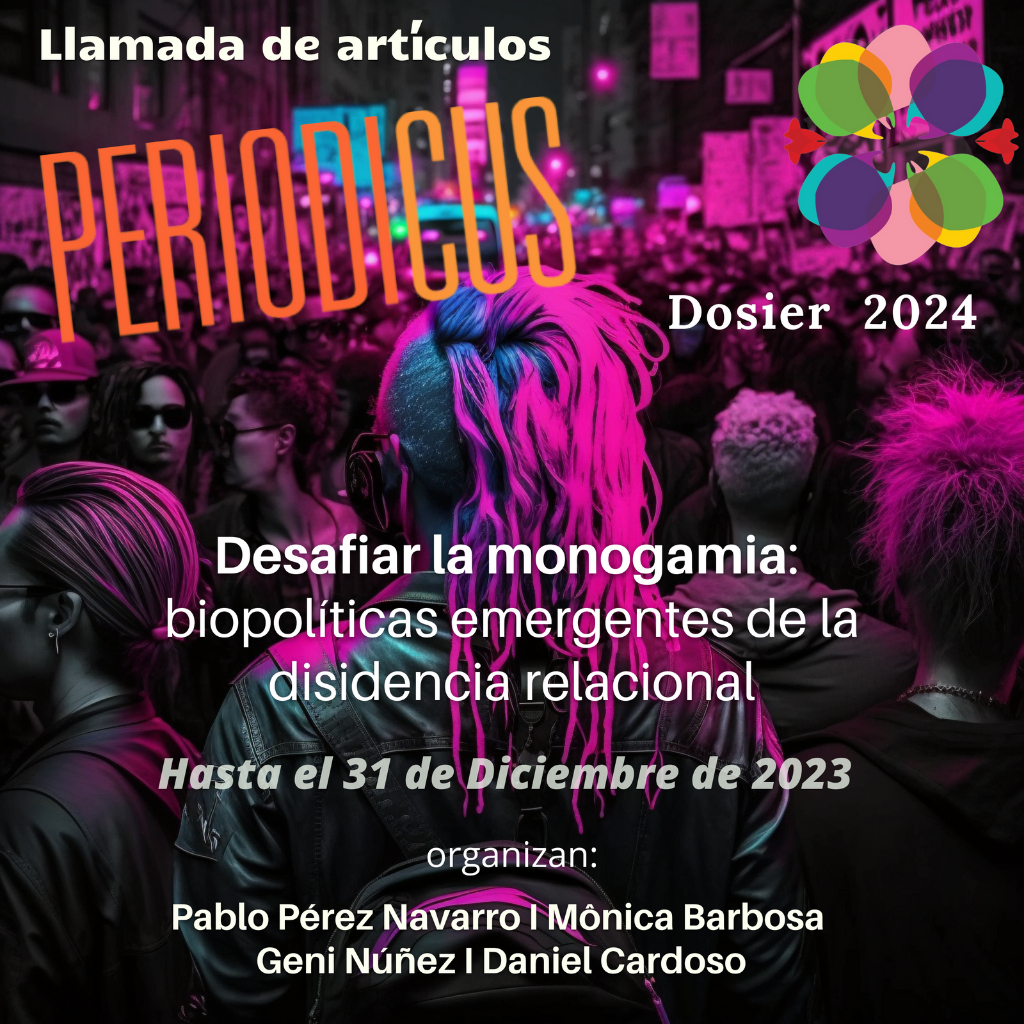Views: 173
Publication
Defying Monogamy: Emerging Biopolitics of Relational Dissidence [Call for papers, DECEMBER 31] - Periódicus
Editors: Pablo Pérez Navarro – Centro de Estudos Socias (CES) da Universidade de Coimbra (Portugal) Mônica Barbosa – Grupo de Pesquisa Políticas, Afetos e Sexualidades Não-Monogâmicas (UFJF) Geni Núñez - ABIPSI (Articulação Brasileira de Indígenas Psicólogos/as) Daniel Cardoso – CICANT – Universidade Lusófona, Portugal, FCSH – Universidade Nova de Lisboa (Portugal)
The cultural imperative of monogamy has been a major concern of multiple traditions of struggle and critical thinking that are not always in harmony with each other. The various Marxisms, anarchist and socialist feminists, lesbian feminism, queer and decolonial studies, indigenous epistemologies, among other lines of thought and political militancy, have found in the criticism of the monogamous organization of affect, sexual relations and kinship ties an unexpected meeting point. This transversality is the result, in our opinion, of the way in which patriarchy, colonialism and class exploitation, among other axes of domination, have used the imposition of the monogamous, reproductive and cis-heterocentric family order to intensify the oppressive relations that define them. This monolithic logic of the colonial world, which treats rivers, forests and other animals as the property and possession of the Human, also pervades interpersonal relationships. It is biopolitical, with sex as a point of articulation between the political, the biological and the economic, both individually and collectively. It is also necropolitical, which leaves bodies, lives and social groups seen as disobedient to the cis-hetero-mononorm open and available to die. For this reason, we consider it essential to keep feminist, anti-colonial, anti-racist, and class perspectives alert when it comes to resisting compulsory monogamy. It is important to center these approaches, in order to keep alive the awareness of how mutable the discourses and definitions of "monogamy" are; and that, from Ancient Greece to current dating apps, we can find traces of a monogamous management of the genders and intimacies that has always been reinventing itself. This task seems even more pertinent in a context marked by the institutionalization of offensives against "gender ideology", in which the strengthening of monogamy as a social and legal norm occupies a surprisingly unremarked position. In effect, how can we forget that these moral crusades, directed above all by Christian fundamentalists, constitute a direct attack against those who seek to develop their eroticism, their affects or their reproductive and child-rearing projects outside the monogamous organization of kinship ties? It is no coincidence, in this sense, that the growing influence of the extreme right in Brazil coincides with the rulings of institutions such as the National Council of Justice (2018) and the Superior Court of Justice (2020), which have sought to consolidate the role monogamy plays within the public order of the nation, thereby underscoring the important place that the colonial legacy of monogamy occupies in the moral universe of the "anti-gender" crusades. And it is also no coincidence that we have witnessed, in several countries during the last decade, the legal recognition of multiparenthood just as a way of resolving disputed child custody cases involving reconstituted monogamous families or, eventually, the resort to assisted reproduction: the exceptions that maintain the norm. Against this backdrop, the pandemic crisis poses specific challenges for alternatives to monogamy. Social distancing policies, in particular, have come to reinforce the image of the nuclear family as a space of security and of relational dissidence as a threat, in a very similar way to what happened with the stigmatization of "risk groups" at the beginning. of the HIV/AIDS pandemic. At the same time, in this period there has been an exponential increase in gender violence, as well as divorces and other crises, over monogamous expectations. These ruptures mark an important discontinuity between the affirmation and the questioning of the monogamous structure. Taking this complexity into account, this thematic issue aims to reflect on the new regulations and the challenges to - and against – the norm of monogamy. Far from trying to define the “proper” space for reflection on this topic, we hope to build bridges between various academic disciplines and, at the same time, between practices and communities that are usually not in dialogue. For this reason, we hope to have contributions that are in dialogue with the proposed theme from different points of view, of a transdisciplinary nature or from areas such as philosophy, anthropology, law, literature, psychology, sociology or art criticism, among others. For this, we propose the following thematic axes: State: Monogamy in the field of law, criminalization of bigamy, state privilege of monogamous relationships, legal recognition of non-monogamous kinship relationships, multiparenthood, non-monogamy and legal activism, alternatives to the centrality of the nuclear family in public policies and social assistance. Communities: Relations between non-monogamous communities and feminist groups, LGBTQI+ and anti-racist movements. Free love, swingers, relational anarchists, non-monogamous kinks, BDSM, polyamory, queer countercultures. Non-monogamies of polygamous, indigenous and Afro-centered communities. Associative experiences and activists of relational dissidence, non-monogamies in protest spaces. Non-monogamous sexualities and moral panics based politics, public order and mononormativity. Pandemic: Returning home: safe space?, monogamization of relationships and their ruptures, sexuality and networks of affections, the strengthening of virtual networks, online sexualities, the dependence of non-monogamies on physical spaces of encounter, parallels and contrasts between the effects of the HIV pandemic and the Covid-19 pandemic on relational life, care networks, non-monogamous relationships and precariousness, body and vulnerability. Decoloniality: Monogamy in the catechization and colonization processes, relationships and contrasts between the representation of non-white bodies and non-monogamous bodies as a threat, relationships between polyamory, polygamy and Islamophobia. Racism in non-monogamous communities, sexuality and non-monogamous kinship in native peoples. Ball culture and queer kinship in Abya Yala. Intersectionality: Racial and gender violence in non-monogamous relationships, non-monogamy in different social classes, non-monogamy and whiteness, non-monogamy and cis-heterogenderism, non-monogamy and old age, monosexism, biphobia, fatphobia, non-monogamous parenting, and gender inequalities in parenting projects, fluidity of masculinities in non-monogamous practices, non-monogamies at the intersection with social oppressions. Finally, we hope that this thematic issue receives contributions from various political and geographical spaces, in order to strengthen South-South and North-South dialogues in studies on non-monogamies, as well as between academic spaces and activist struggles.
![Defying Monogamy: Emerging Biopolitics of Relational Dissidence [Call for papers, DECEMBER 31] - Periódicus](https://trialogues.ces.uc.pt/wp-content/uploads/2023/02/Chamada_insta_EN.png)


